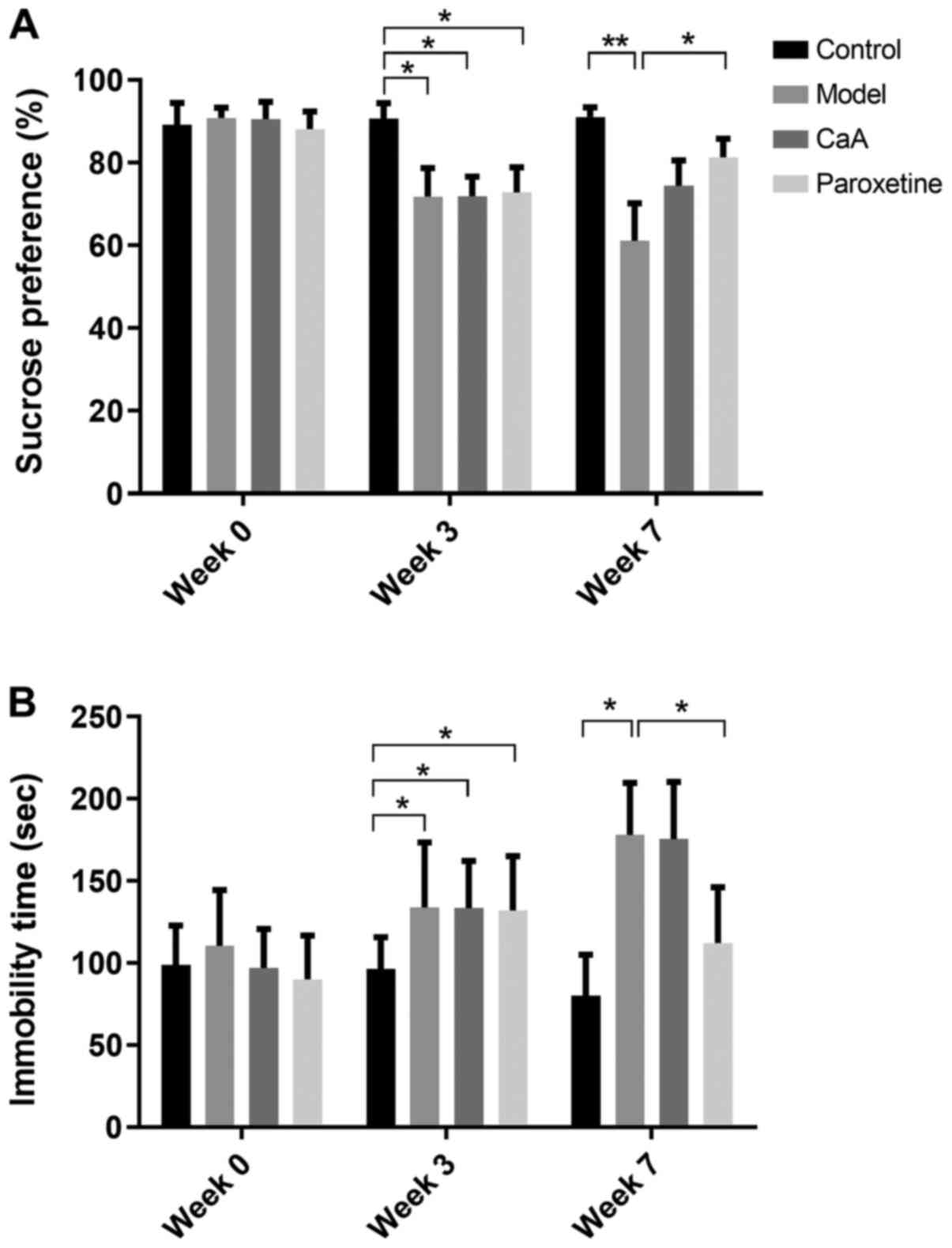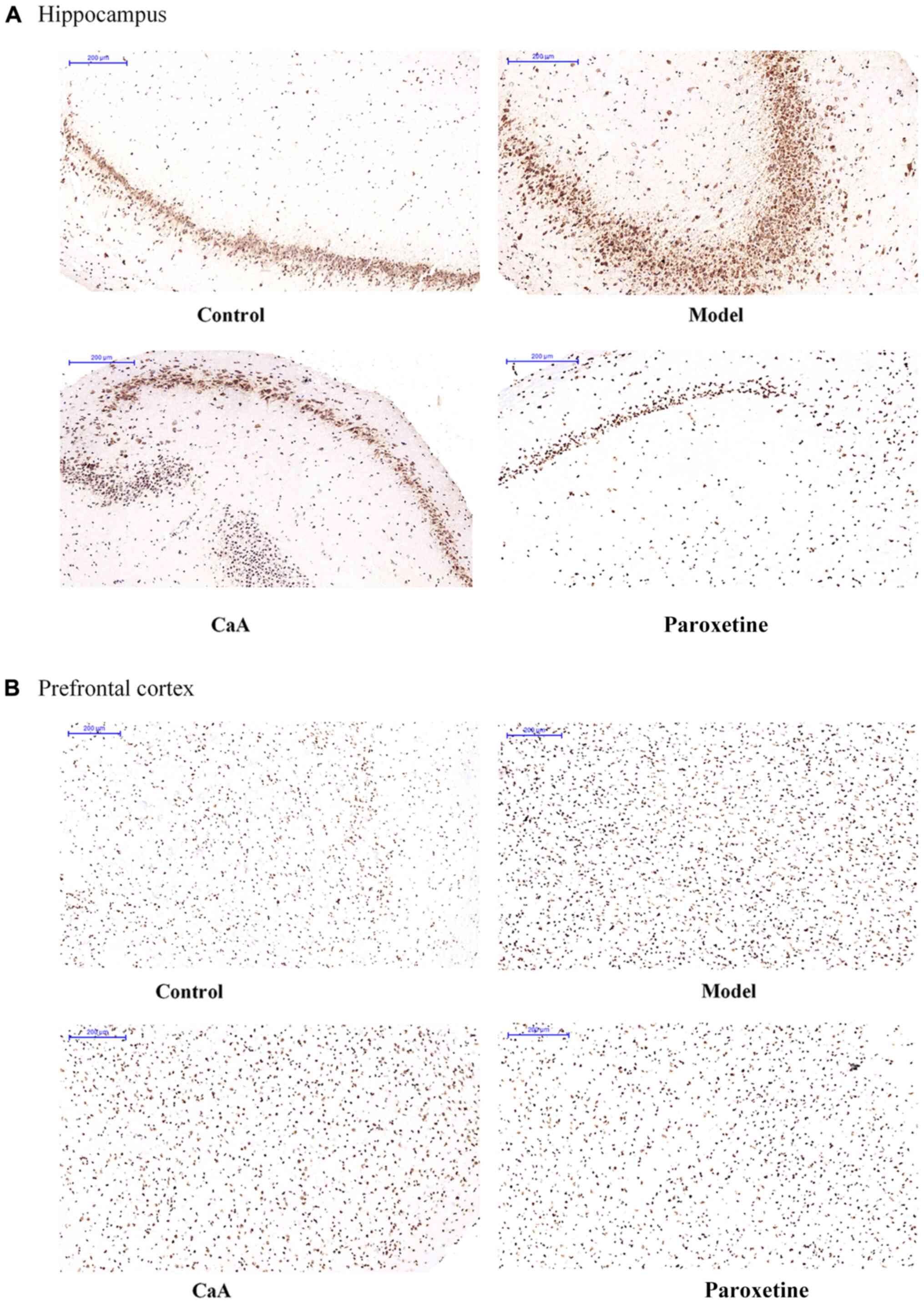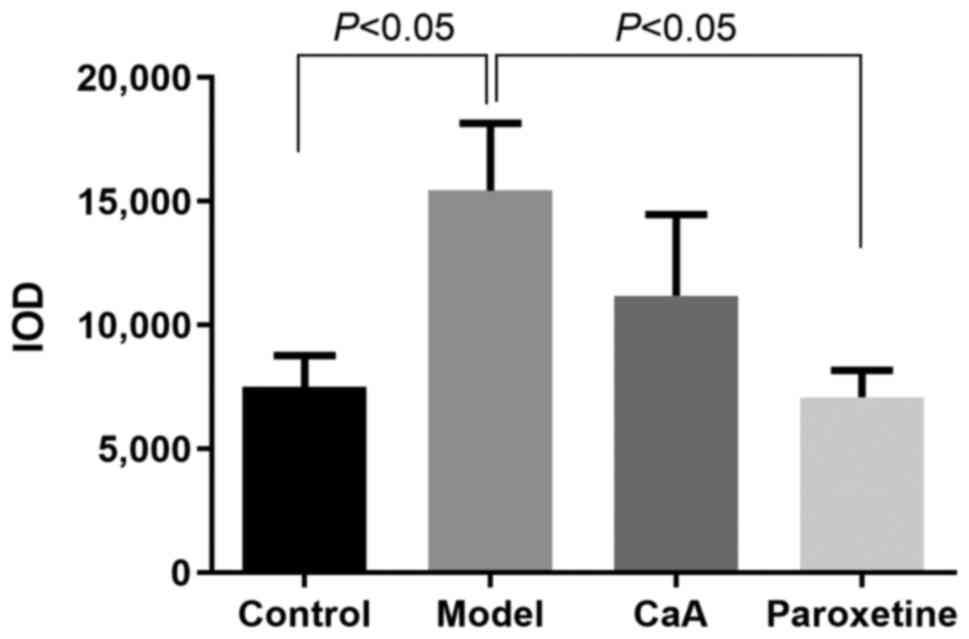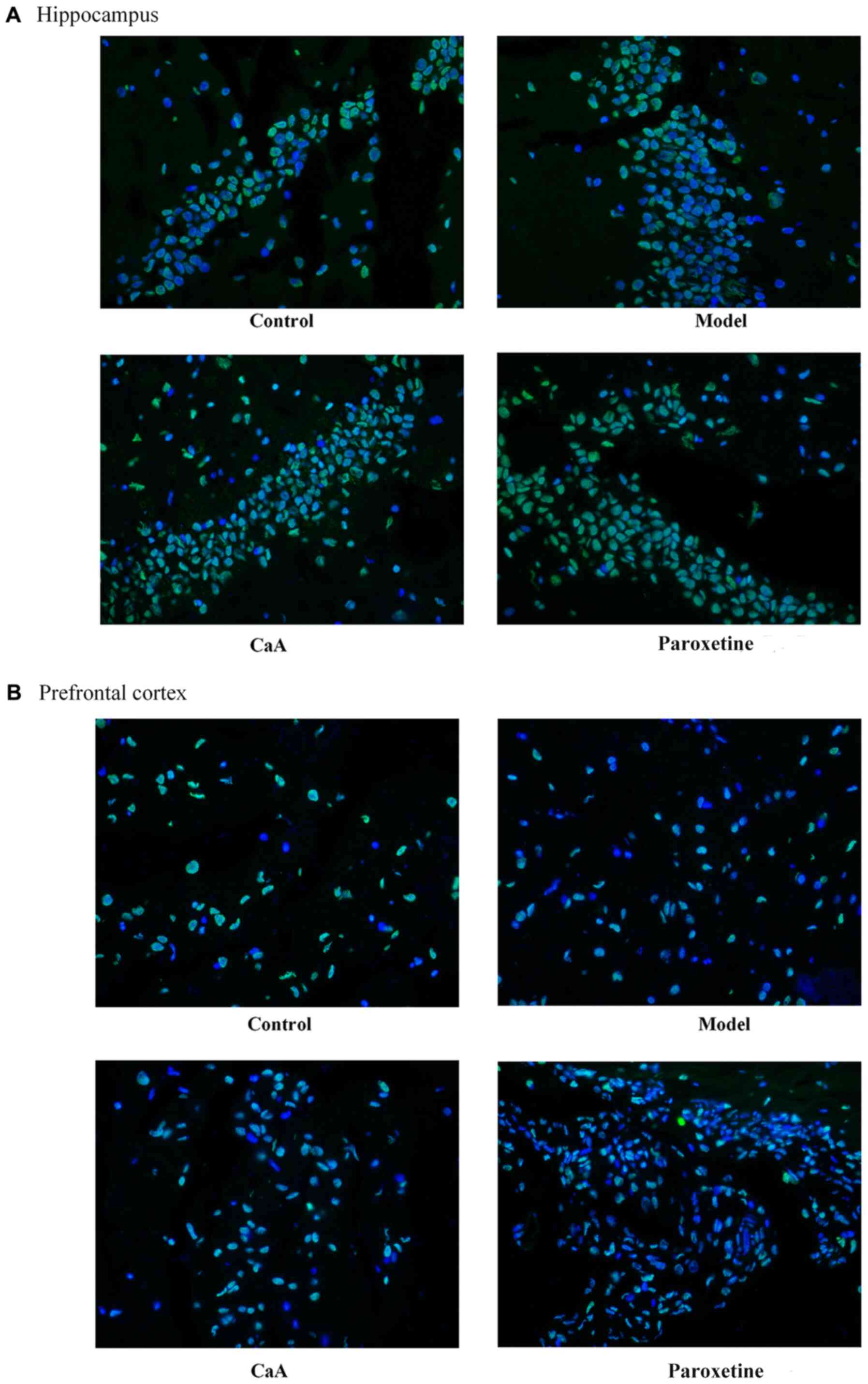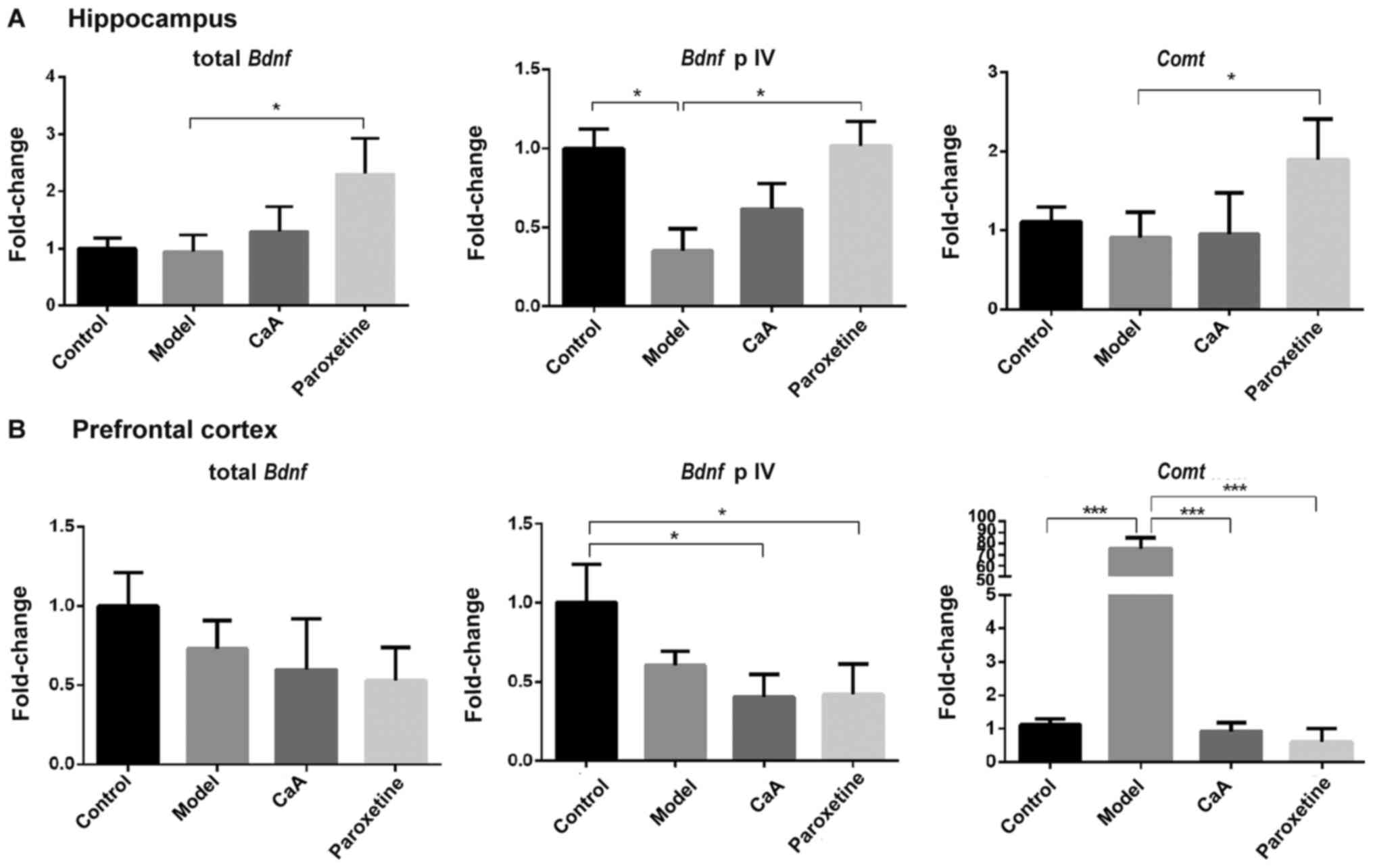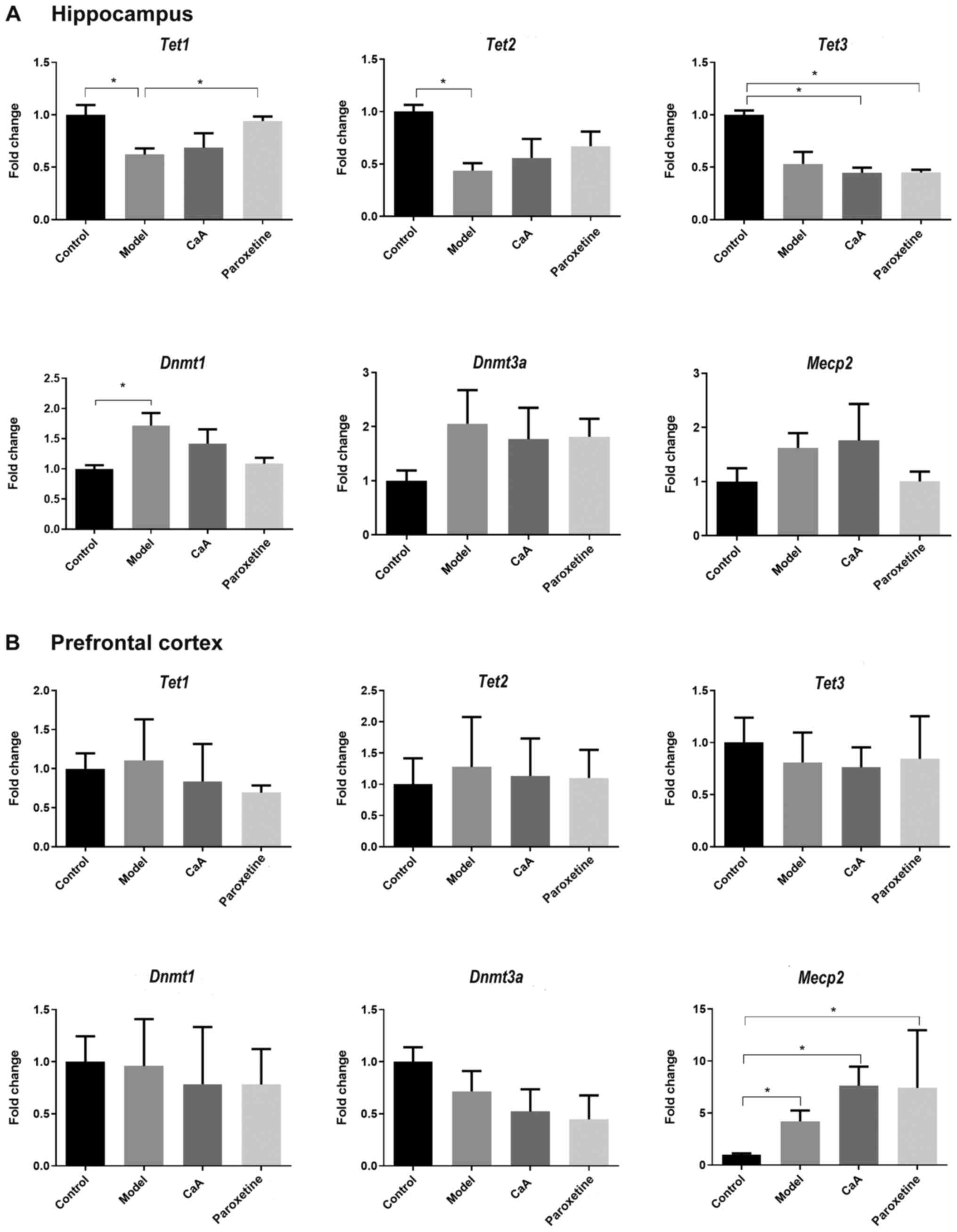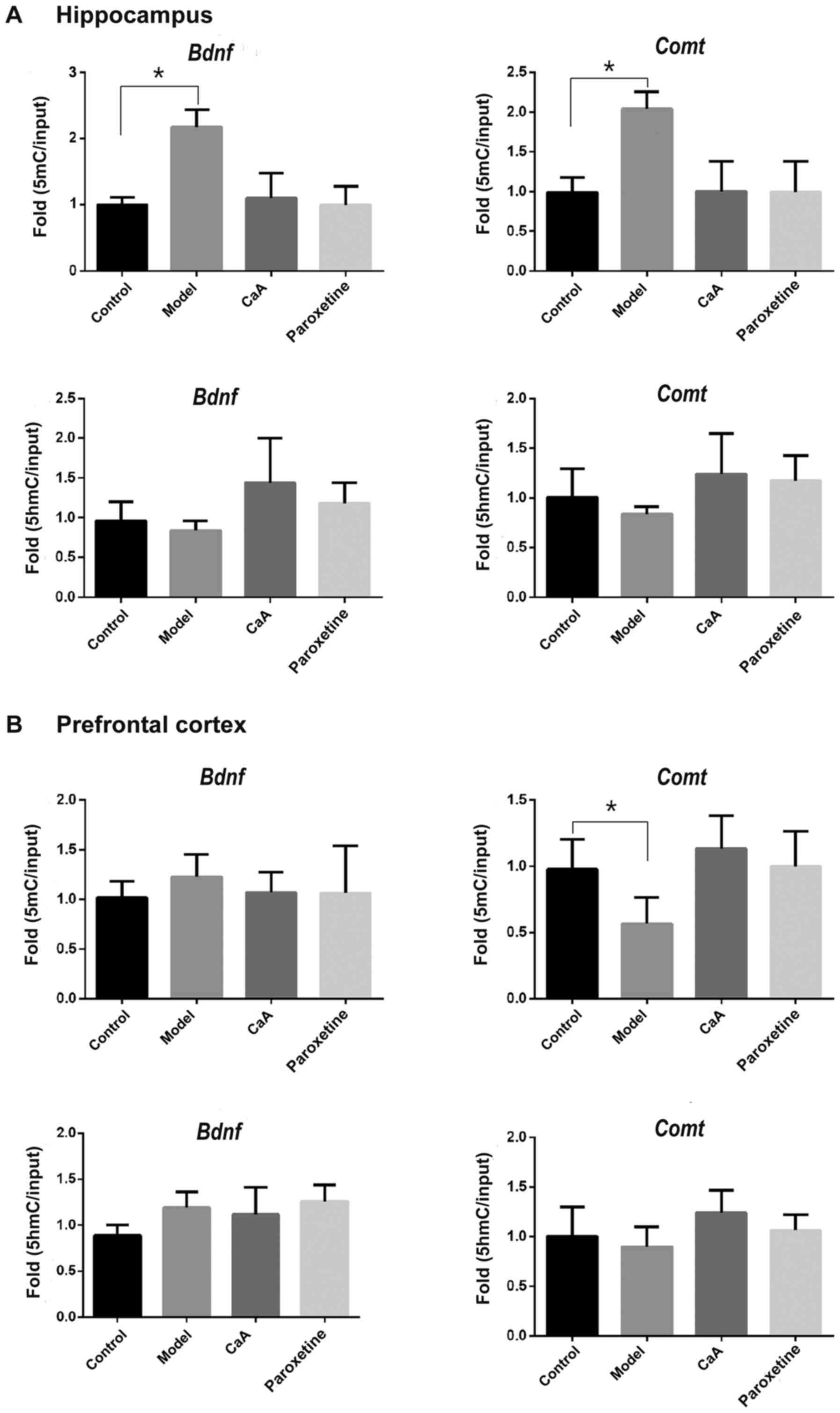|
1
|
Touaibia M, Jean-François J and Doiron J:
Caffeic Acid, a versatile pharmacophore: An overview. Mini Rev Med
Chem. 11:695–713. 2011.PubMed/NCBI
|
|
2
|
Onori P, DeMorrow S, Gaudio E, Franchitto
A, Mancinelli R, Venter J, Kopriva S, Ueno Y, Alvaro D, Savage J,
et al: Caffeic acid phenethyl ester decreases cholangiocarcinoma
growth by inhibition of NF-kappaB and induction of apoptosis. Int J
Cancer. 125:565–576. 2009.PubMed/NCBI
|
|
3
|
Son S and Lewis BA: Free radical
scavenging and antioxidative activity of caffeic acid amide and
ester analogues: Structure-activity relationship. J Agric Food
Chem. 50:468–472. 2002.PubMed/NCBI
|
|
4
|
Koltuksuz U, Mutuş HM, Kutlu R, Ozyurt H,
Cetin S, Karaman A, Gürbüz N, Akyol O and Aydin NE: Effects of
caffeic acid phenethyl ester and epidermal growth factor on the
development of caustic esophageal stricture in rats. J Pediatr
Surg. 36:1504–1509. 2001.PubMed/NCBI
|
|
5
|
Borrelli F, Izzo AA, Di Carlo G, Maffia P,
Russo A, Maiello FM, Capasso F and Mascolo N: Effect of a propolis
extract and caffeic acid phenethyl ester on formation of aberrant
crypt foci and tumors in the rat colon. Fitoterapia. 73 (Suppl
1):S38–S43. 2002.PubMed/NCBI
|
|
6
|
Lee WJ and Zhu BT: Inhibition of DNA
methylation by caffeic acid and chlorogenic acid, two common
catechol-containing coffee polyphenols. Carcinogenesis. 27:269–277.
2006.PubMed/NCBI
|
|
7
|
Ira E, Zanoni M, Ruggeri M, Dazzan P and
Tosato S: COMT, neuropsychological function and brain structure in
schizophrenia: A systematic review and neurobiological
interpretation. J Psychiatry Neurosci. 38:366–380. 2013.PubMed/NCBI
|
|
8
|
Samavat H and Kurzer MS: Estrogen
metabolism and breast cancer. Cancer Lett. 356A:A231–A243.
2015.
|
|
9
|
Matsumoto M, Weickert CS, Beltaifa S,
Kolachana B, Chen J, Hyde TM, Herman MM, Weinberger DR and Kleinman
JE: Catechol O-methyltransferase (COMT) mRNA expression in the
dorsolateral prefrontal cortex of patients with schizophrenia.
Neuropsychopharmacology. 28:1521–1530. 2003.PubMed/NCBI
|
|
10
|
Lin CH, Chaudhuri KR, Fan JY, Ko CI, Rizos
A, Chang CW, Lin HI and Wu YR: Depression and
Catechol-O-methyltransferase (COMT) genetic variants are associated
with pain in Parkinson's disease. Sci Rep. 7:63062017.PubMed/NCBI
|
|
11
|
Egan MF, Goldberg TE, Kolachana BS,
Callicott JH, Mazzanti CM, Straub RE, Goldman D and Weinberger DR:
Effect of COMT Val108/158 Met genotype on frontal lobe
function and risk for schizophrenia. Proc Natl Acad Sci USA.
98:6917–6922. 2001.PubMed/NCBI
|
|
12
|
Swift-Scanlan T, Smith CT, Bardowell SA
and Boettiger CA: Comprehensive interrogation of CpG island
methylation in the gene encoding COMT, a key estrogen and
catecholamine regulator. BMC Med Genomics. 7:52014.PubMed/NCBI
|
|
13
|
Na KS, Won E, Kang J, Kim A, Choi S, Tae
WS, Kim YK, Lee MS, Joe SH and Ham BJ: Differential effect of COMT
gene methylation on the prefrontal connectivity in subjects with
depression versus healthy subjects. Neuropharmacology. 137:59–70.
2018.PubMed/NCBI
|
|
14
|
Wu Q, Odwin-Dacosta S, Cao S, Yager JD and
Tang WY: Estrogen down regulates COMT transcription via promoter
DNA methylation in human breast cancer cells. Toxicol Appl
Pharmacol. 367:12–22. 2019.PubMed/NCBI
|
|
15
|
Bustamante AC, Armstrong DL and Uddin M:
Epigenetic profiles associated with major depression in the human
brain. Psychiatry Res. 260:439–442. 2018.PubMed/NCBI
|
|
16
|
Tahiliani M, Koh KP, Shen Y, Pastor WA,
Bandukwala H, Brudno Y, Agarwal S, Iyer LM, Liu DR, Aravind L, et
al: Conversion of 5-methylcytosine to 5-hydroxymethylcytosine in
mammalian DNA by MLL partner TET1. Science. 324:930–935.
2009.PubMed/NCBI
|
|
17
|
Ito S, D'Alessio AC, Taranova OV, Hong K,
Sowers LC and Zhang Y: Role of Tet proteins in 5mC to 5hmC
conversion, ES-cell self-renewal and inner cell mass specification.
Nature. 466:1129–1133. 2010.PubMed/NCBI
|
|
18
|
Wei Y, Melas PA, Wegener G, Mathé AA and
Lavebratt C: Antidepressant-like effect of sodium butyrate is
associated with an increase in TET1 and in 5-hydroxymethylation
levels in the Bdnf gene. Int J Neuropsychopharmacol.
18:pyu0322014.PubMed/NCBI
|
|
19
|
Angelucci F, Brenè S and Mathé AA: BDNF in
schizophrenia, depression and corresponding animal models. Mol
Psychiatry. 10:345–352. 2005.PubMed/NCBI
|
|
20
|
Aid T, Kazantseva A, Piirsoo M, Palm K and
Timmusk T: Mouse and rat BDNF gene structure and expression
revisited. J Neurosci Res. 85:525–535. 2007.PubMed/NCBI
|
|
21
|
Lubin FD, Roth TL and Sweatt JD:
Epigenetic regulation of BDNF gene transcription in the
consolidation of fear memory. J Neurosci. 28:10576–10586.
2008.PubMed/NCBI
|
|
22
|
Boulle F, van den Hove DL, Jakob SB,
Rutten BP, Hamon M, van Os J, Lesch KP, Lanfumey L, Steinbusch HW
and Kenis G: Epigenetic regulation of the BDNF gene: Implications
for psychiatric disorders. Mol Psychiatry. 17:584–596.
2012.PubMed/NCBI
|
|
23
|
Martinowich K, Hattori D, Wu H, Fouse S,
He F, Hu Y, Fan G and Sun YE: DNA methylation-related chromatin
remodeling in activity-dependent BDNF gene regulation. Science.
302:890–893. 2003.PubMed/NCBI
|
|
24
|
Hill MN, Hellemans KG, Verma P, Gorzalka
BB and Weinberg J: Neurobiology of chronic mild stress: Parallels
to major depression. Neurosci Biobehav Rev. 36:2085–2117.
2012.PubMed/NCBI
|
|
25
|
Willner P: Validity, reliability and
utility of the chronic mild stress model of depression: A 10-year
review and evaluation. Psychopharmacology (Berl). 134:319–329.
1997.PubMed/NCBI
|
|
26
|
Yu X, Qiao S, Wang D, Dai J, Wang J, Zhang
R, Wang L and Li L: A metabolomics-based approach for ranking the
depressive level in a chronic unpredictable mild stress rat model.
Rsc Adv:6:25751–25765. 2016.
|
|
27
|
Livak KJ and Schmittgen TD: Analysis of
relative gene expression data using real-time quantitative PCR and
the 2(-Delta Delta C(T)) Method. Methods. 25:402–408.
2001.PubMed/NCBI
|
|
28
|
Jeschke J, Collignon E and Fuks F:
Portraits of TET-mediated DNA hydroxymethylation in cancer. Curr
Opin Genet Dev. 36:16–26. 2016.PubMed/NCBI
|
|
29
|
Rivas MP, Aguiar TFM, Fernandes GR,
Caires-Júnior LC, Goulart E, Telles-Silva KA, Cypriano M, de Toledo
SRC, Rosenberg C, Carraro DM, et al: TET Upregulation Leads to
5-Hydroxymethylation Enrichment in Hepatoblastoma. Front Genet.
10:5532019.PubMed/NCBI
|
|
30
|
Irwin RE, Pentieva K, Cassidy T,
Lees-Murdock DJ, McLaughlin M, Prasad G, McNulty H and Walsh CP:
The interplay between DNA methylation, folate and neurocognitive
development. Epigenomics. 8:863–879. 2016.PubMed/NCBI
|
|
31
|
Gross JA, Pacis A, Chen GG, Drupals M,
Lutz PE, Barreiro LB and Turecki G: Gene-body 5-hydroxymethylation
is associated with gene expression changes in the prefrontal cortex
of depressed individuals. Transl Psychiatry. 7:e11192017.PubMed/NCBI
|
|
32
|
Nan X, Campoy FJ and Bird A: MeCP2 is a
transcriptional repressor with abundant binding sites in genomic
chromatin. Cell. 88:471–481. 1997.PubMed/NCBI
|
|
33
|
Li LC and Dahiya R: MethPrimer: Designing
primers for methylation PCRs. Bioinformatics. 18:1427–1431.
2002.PubMed/NCBI
|
|
34
|
Seo MK, Ly NN, Lee CH, Cho HY, Choi CM,
Nhu LH, Lee JG, Lee BJ, Kim GM, Yoon BJ, et al: Early life stress
increases stress vulnerability through BDNF gene epigenetic changes
in the rat hippocampus. Neuropharmacology. 105:388–397.
2016.PubMed/NCBI
|
|
35
|
Brenet F, Moh M, Funk P, Feierstein E,
Viale AJ, Socci ND and Scandura JM: DNA methylation of the first
exon is tightly linked to transcriptional silencing. PLoS One.
6:e145242011.PubMed/NCBI
|
|
36
|
Klengel T, Pape J, Binder EB and Mehta D:
The role of DNA methylation in stress-related psychiatric
disorders. Neuropharmacology. 80:115–132. 2014.PubMed/NCBI
|
|
37
|
Li W and Liu M: Distribution of
5-hydroxymethylcytosine in different human tissues. J Nucleic
Acids. 2011:8707262011.PubMed/NCBI
|
|
38
|
Na KS, Chang HS, Won E, Han KM, Choi S,
Tae WS, Yoon HK, Kim YK, Joe SH, Jung IK, et al: Association
between glucocorticoid receptor methylation and hippocampal
subfields in major depressive disorder. PLoS One.
9:e854252014.PubMed/NCBI
|
|
39
|
Sakata K, Jin L and Jha S: Lack of
promoter IV-driven BDNF transcription results in depression-like
behavior. Genes Brain Behav. 9:712–721. 2010.PubMed/NCBI
|
|
40
|
Keller S, Sarchiapone M, Zarrilli F,
Videtic A, Ferraro A, Carli V, Sacchetti S, Lembo F, Angiolillo A,
Jovanovic N, et al: Increased BDNF promoter methylation in the
Wernicke area of suicide subjects. Arch Gen Psychiatry. 67:258–267.
2010.PubMed/NCBI
|
|
41
|
Laatikainen LM, Sharp T, Harrison PJ and
Tunbridge EM: Sexually dimorphic effects of
catechol-O-methyltransferase (COMT) inhibition on dopamine
metabolism in multiple brain regions. PLoS One.
8:e618392013.PubMed/NCBI
|
|
42
|
Kim JK, Samaranayake M and Pradhan S:
Epigenetic mechanisms in mammals. Cell Mol Life Sci. 66:596–612.
2009.PubMed/NCBI
|
|
43
|
Li Y, Jiang F, Chen L, Yang Y, Cao S, Ye
Y, Wang X, Mu J, Li Z and Li L: Blockage of TGFβ-SMAD2 by
demethylation-activated miR-148a is involved in caffeic
acid-induced inhibition of cancer stem cell-like properties in
vitro and in vivo. FEBS Open Bio. 5:466–475. 2015.PubMed/NCBI
|
|
44
|
Omene C, Kalac M, Wu J, Marchi E, Frenkel
K and O'Connor OA: Propolis and its Active Component, Caffeic Acid
Phenethyl Ester (CAPE), Modulate Breast Cancer Therapeutic Targets
via an Epigenetically Mediated Mechanism of Action. J Cancer Sci
Ther. 5:334–342. 2013.PubMed/NCBI
|















